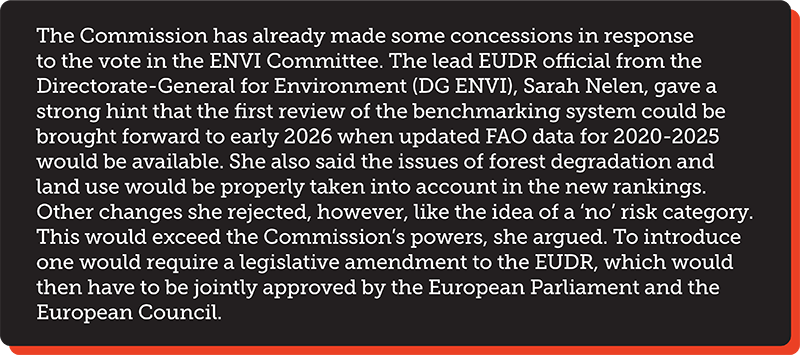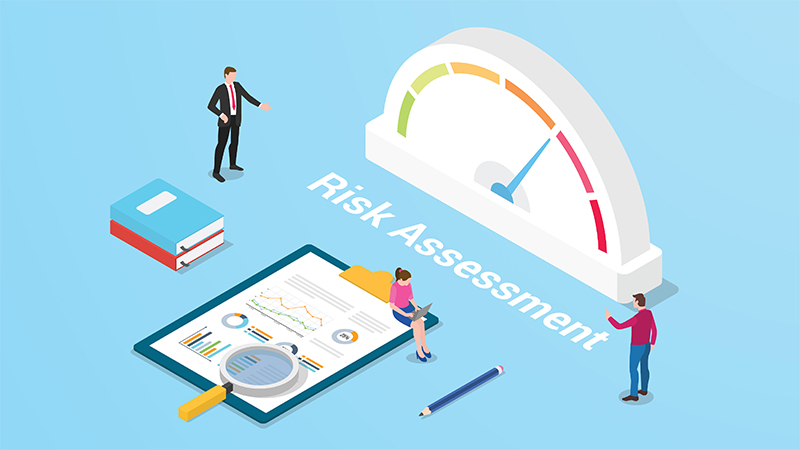EUDR Runs into Difficulty in the European Parliament
The EU’s Deforestation Regulation faces mounting criticism in Parliament over its risk classification system, with calls for urgent reassessment before it takes effect.

The European Commission might have expected a slightly easier ride from its own Parliament, but its Deforestation Regulation (EUDR) is encountering as much opposition from Members of the European Parliament (MEPs) as it is from partner countries. On 24 June this year, the European Parliament’s Environment Committee (ENVI) voted on two separate MEP-tabled resolutions objecting to the way the Commission is implementing EUDR. Of particular concern is the Commission’s ‘country benchmarking’ system that classifies every global partner country into ‘high, ‘standard’ and ‘low’ risk categories according to the perceived risk of deforestation they pose. Every EU member state, plus countries like the US, have been classified as ‘low’ risk; countries like Malaysia have been deemed ‘standard’ risk.
The MEPs’ criticisms closely mirror those of MPOC. They argue that the Commission’s assessments are based on forest data that is out-of-date; and that a new ‘no’ risk category should be created for EU member states. The proposer of the first objection, Austrian MEP Alexander Bernhuber from the centre-right European People’s Party, argued that this skewed results against those countries that have made the most progress on deforestation in recent years.
More pointedly, by focusing solely on total forest loss, the Commission had overlooked primary forest loss, which is far more egregious to the planet. These omissions (and the MEPs’ responses to them) raise questions about the credibility of the benchmarking system – particularly when the US and certain EU Member States are deemed ‘low’ risk despite having worse records than Malaysia on forest degradation. MEP Alexander Bernhuber called for the Commission to re-run the benchmarking assessments using better, more appropriate, up-to-date data.

The Commission’s assessments are based on forest data that is out-of-date.
Many of the same issues were also raised in the second objection by French MEP Mathilde Androuët from the right-wing Patriots for Europe party. She flagged the outdated data and flawed methodology, as well as the needlessly excessive regulation for what she called ‘negligible’ risk countries.

By focusing solely on total forest loss, the Commission had overlooked primary forest loss, which is far more egregious to the planet.
In the event, Androuët’s objection was rejected, but Bernhuber’s resolution was passed by 49 votes to 37 and would now proceed to Plenary in the week commencing 6 July 2025, when all 705 MEPs in the European Parliament will have the chance to vote. As expected, a majority voted in favour and Bernhuber’s resolution was formally adopted by the Parliament. This is a significant political win for critics of the EUDR, but the decision is non-binding on the Commission, meaning it would not be obliged to change its plans in response. However, the Commission might still wish to – ignoring a vote by the whole of the European Parliament is not a good look. It would be failing to heed a major signal of political discontent with the current proposal. Further concessions are likely, therefore.

For third countries like Malaysia, it is encouraging to see that certain MEPs also recognise the shortcomings of the current proposal and that the European Commission is capable of rapid amendment. However, questions remain over the timing of any new benchmarking review. New FAO data should be available in the early 4th quarter, but it seems likely that the current system will be in place by the time the EUDR regime becomes effective at the end of this year. If a revision quickly follows the current system, it will cause turbulence and uncertainty for importers and suppliers. A country’s risk status carries significant reputational baggage: With so much uncertainty, not to mention compliance burden and cost, why would an importer choose anything other than a ‘low’ risk supplier, even if the quality is lower?
The Commission should be strongly encouraged to issue a new set of assessments before the EUDR takes effect. Doing so would offer much-needed clarity and market stability for both exporters and producers. It would also help avoid the awkward scenario of producers being assigned one risk designation at the outset, only to face a different classification with entirely new obligations a few months later. This is the message MEPs should be sending. Time will tell whether the Commission is listening.

The Commission should be strongly encouraged to issue a new set of assessments before the EUDR takes effect.




